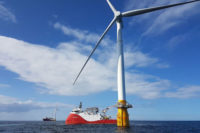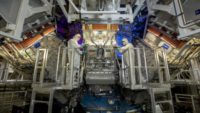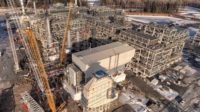President Donald J. Trump began making good on campaign promises to put Americans back to work and reduce the size of government, as he signed orders and memoranda setting in motion approval of the Obama administration-halted Keystone XL and Dakota Access pipelines and streamlining of infrastructure and manufacturing permitting processes. But firms and watchdog groups are concerned how an announced freezing of government hiring and contracting will play out, as well as the future of environmental protection.
At a Jan. 24 meeting with automakers, the president hailed the thousands of construction jobs his actions would create but said, “It’s the long-term jobs I want.” In a meeting the day before with 12 U.S. manufacturing-firm CEOs, Trump reported that his team believes regulation affecting those firms can be cut by 75% to ease U.S. factory-building. “It’s out of control,” Trump said of existing environmental regulations. “We are going to either give you your permits or we’re not going to give you your permits, but you’re going to know very quickly. And, generally speaking, we’re going to be giving you your permits.”
Meanwhile, Senate committees on Jan. 23 approved and sent to the Senate for full confirmation nominee Elaine Chao to be transportation secretary and nominee Rex Tillerson to be secretary of state. But committee votes for Energy Dept. pick Rick Perry and Interior Dept. nominee Ryan Zinke were inexplicably pulled from the Senate Energy and Natural Resources Agenda late on Jan. 23. A vote on Trump’s controversial choice to lead the U.S. Environmental Protection Agency, Oklahoma attorney general Scott Pruitt, has not been scheduled.
Senate Democrats on Jan. 24 pushed forward their own plans to put Americans back to work with a proposal for the U.S. to invest $1 trillion in infrastructure over the next decade, a plan they said would create 15 million jobs. “We used to lead the world in the quality of our infrastructure,” said Sen. Bernie Sanders (I-Vt.). “Today, we are No. 12. When we rebuild our infrastructure, we rebuild our middle class.”
Hiring Freeze
It wasn’t immediately clear how far-reaching a Jan. 23 executive order implementing a hiring freeze on some government agencies would be. The order says outside contractors may not be hired to supplement the workforce. According to ProPublica and other news sources, in an apparent response to the order, EPA put a freeze on all new grants and contract work. CH2M, which has dozens of EPA contracts, deferred comments to the agency, which did not respond to ENR’s question about what the freeze would mean to existing contracts.
The freeze is temporary, however, until the Office of Management and Budget recommends a long-term plan, due in 90 days, on how to reduce the size of the federal workforce. The Association of Federal Employees said the plan could lead to the hiring of more contractors.
Building trades and other labor leaders cheered five executive orders, signed by Trump on Jan. 24, that clear the way for the delayed Keystone XL and Dakota Access pipelines, expediting approvals for “high priority” infrastructure projects and requiring U.S. manufactured steel to be used in the pipelines. “It is beginning to feel like a new day,” said Terry O’ Sullivan, general president of the Laborers’ International Union of North America, one of the meeting attendees. He referred to “leaving the politicization of decisions over energy projects in the dustbin of the past.” O’Sullivan said four pipeline unions have more than $50 billion worth of work under contract, including 4,500 workers on the Dakota Access.
In a statement, North America’s Building Trades Unions President Sean McGarvey noted Trump’s awareness that “32% of today’s construction-industry workforce is employed on energy projects and that projects such as Keystone XL and Dakota Access pipelines are significant job creators that generate above-average wages and benefits.”
Trump signed four presidential memorandums relating to pipelines. He directed federal agencies to expedite review for the remaining portion of the $3.8-billion Dakota Access project, which is more than 95% complete, say the pipeline’s owners. It had been stalled after the Standing Rock Sioux Tribe objected to the construction under Lake Oahe in North Dakota. In December, the Army Corps of Engineers said it would look for alternative routes. Another memo initiates the process for the Keystone XL cross-border pipeline. President Obama rejected it over environmental concerns in 2015.
Approval of both pipelines is “subject to terms and conditions to be negotiated by us,” Trump said. The memoranda came a day after Trump talked with company executives about the state of U.S. infrastructure, calling it “not strong” and inhibiting free commerce. “Infrastructure continues to be a huge priority,” he said. But there was speculation on the reality of an originally promised $1-trillion program. Said one industry firm executive, “Trump’s MO is that of a negotiator—aim big, but compromise as needed to get the deal done. He wants $1 trillion, but in the end he will compromise on a lower number and claim it is a huge victory.”
Business as Usual
Environmental groups were not bolstered that, in confirmation hearings, nominees Pruitt, Perry and Ryan Zinke all acknowledged that climate change is real and humans are causing some of it. White House spokesman Sean Spicer confirmed that Trump’s administration will take climate-change actions that are smart for the environment while increasing economic growth. “There is a balance,” Spicer said. The Sierra Club said it’s not unusual to hear such rhetoric, pitting the environment against economic growth.
During his confirmation hearing, Pruitt said the rule of law matters and that it is not the job of the agency to pick winners or losers against any segment of the economy. Senators, however, gave examples of Pruitt’s siding with industry over the health and safety of the state’s citizens in the 14 lawsuits his office has filed against the agency. Pruitt said his actions as attorney general represent the interest of the people of Oklahoma.
As Trump moved forward with his agenda, Senate Democrats challenged the new president to adopt their infrastructure plan, which would be an investment that would not necessarily need a budget offset, said Senate Minority Leader Chuck Schumer. Among other areas, Democrats would dedicate $210 billion to roads, $110 billion to water and sewer systems and $100 million for energy infrastructure.









Post a comment to this article
Report Abusive Comment